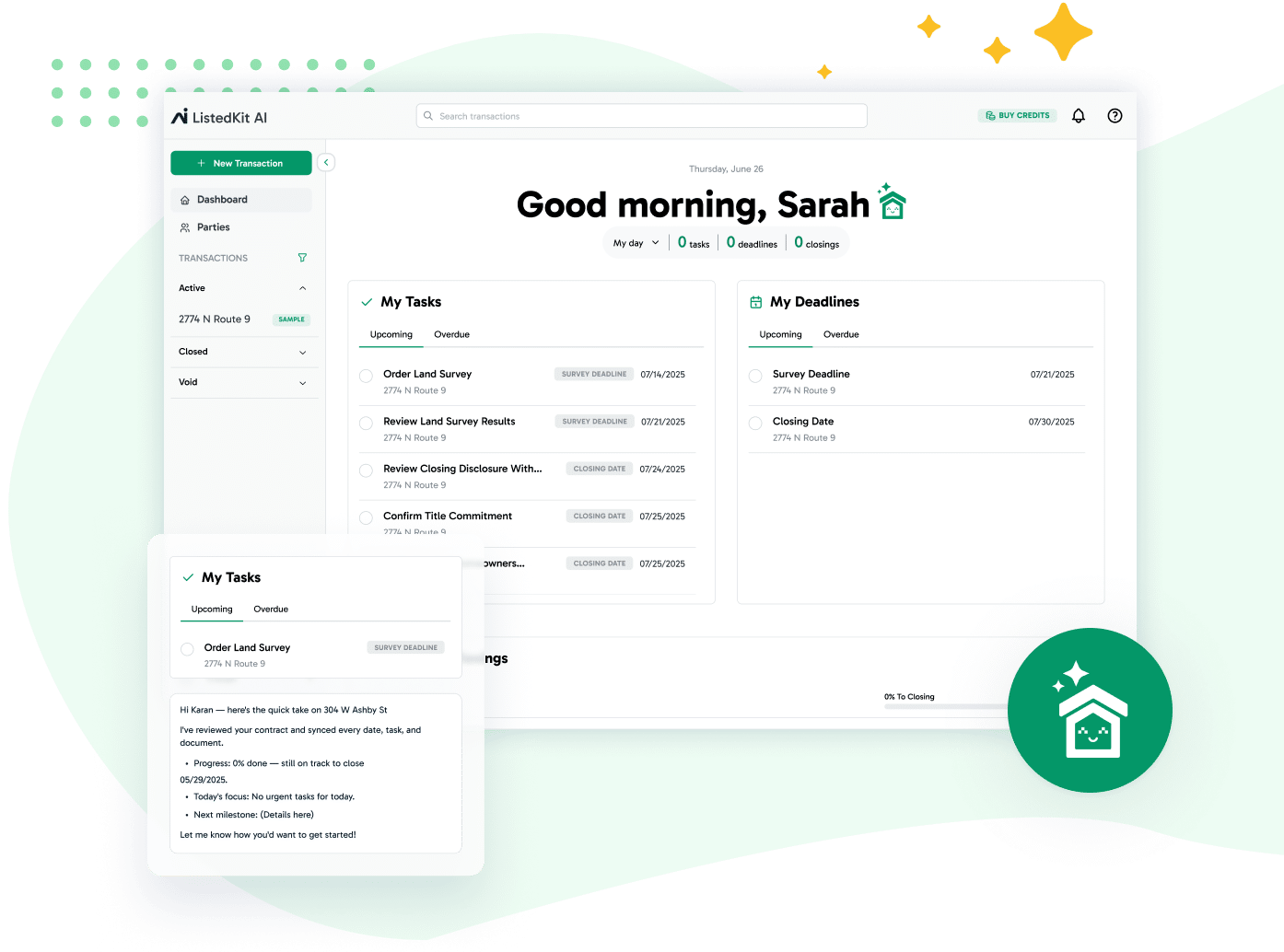As the real estate market shifts, there’s an argument to be made that independent transaction coordinators (TCs) can view this as an opportunity. With real estate agents looking to trim their expenses, TCs might be in an excellent position to promote their services as affordable and highly skilled options.
TCs can maintain and grow their client base even during tough periods by presenting themselves as essential partners.
In this article, we’ll talk about various growth tactics—such as bringing in virtual assistants (VAs), using technology effectively, and ramping up marketing efforts—to help TCs remain competitive and actually flourish.
Hiring and Managing Virtual Assistants
Hiring virtual assistants (VAs) is a game changer for transaction coordinators looking to scale their real estate business. As the workload grows with more real estate transactions, handling every aspect of the process can get overwhelming. VAs offer a scalable solution and allow you to:
- Delegate administrative tasks like managing client databases and scheduling property inspections and paperwork.
- Reduce burnout by freeing up your time to focus on client relationships, closing deals and overseeing the transactions.
How to Find the Right VA: Sourcing and Selection Tips
When we talked to Tanya about her approach to hiring VAs, she put great emphasis on personality over skills. And recommended that TCs look for someone who asks questions rather than makes assumptions.
“If you don’t love their personality and get along with them, it’s not going to enhance your day”
—Tanya Knowles
Here are some key things to look for:
- Cultural fit: Make sure the VA fits your work style and improves your daily operations.
- Responsiveness: A good VA communicates clearly and frequently, especially in the rapid industry.
- Confidence: Look for someone who is comfortable asking questions and is willing to learn.
Tanya also mentioned that it’s better to hire early before you’re overwhelmed and have time to train and onboard them.
Training and Onboarding
Training VAs requires patience and a clear process:
- Break tasks into smaller steps. Tanya said, “For one task, there are about seven smaller tasks.” So it’s important to be aware of these and delegate tasks keeping the sub-tasks in mind.
- Digital tools like Zoom can be used to record training sessions that can be used for future hires.
- Document everything. Spreadsheets for task tracking and communication preferences are key to reducing back-and-forth questions.
Managing Remotely: Best Practices
Here are some things you can do as a real estate transaction coordinator to maintain productivity between your team and VAs:
- Over-communicate expectations and provide regular updates to keep tasks on track.
- Have frequent check-ins, especially at the beginning, to review progress and answer client questions.
- Gradually add more responsibilities to build their confidence and skill set.
A well-trained VA can handle routine tasks so you can focus on growing your transaction coordinator business, providing amazing service and more real estate deals.
Expanding Service Offerings
Adding services is one of the best ways to grow your transaction coordinator business. By offering more, you can meet more client needs and stand out from other real estate professionals.
Adding services also increases your value and attracts more potential clients, giving you an edge in a competitive real estate market.
Opportunities: Client Needs and Market Gaps
To start adding services, analyze the gaps in the market and your client base. What are the common struggles real estate agents and clients face during real estate transactions? It can range from coordinating property inspections to managing legal requirements.
Listen to your client’s pain points, and you’ll find services that will solve those problems and make the transaction process easier.
Service Diversification
Here are some more services you can offer to make your business more attractive:
- Administrative support: Legal paperwork, scheduling property inspections, communication between clients and escrow agents.
- Client relationship management: Using tools to manage client databases, provide regular updates and offer a more personalized service throughout the closing process.
- Marketing support: Help real estate agents with marketing tasks like email campaigns, social proof strategies and customer question forms to simplify their marketing.
- Virtual tours and digital tools: As virtual tours become more popular, we offer to set these up for agents working with out-of-town buyers.
Pricing: Increasing Profitability
When pricing these services, consider the value you bring and the time it takes for each task. You can charge a flat fee per transaction or tiered pricing based on the type of real estate transaction.
Offering packages can work, too, so clients can choose the level of service they need. The key is to balance great service and profitability while growing.
Increasing Transaction Volume
To grow your transaction coordinator business and handle more transactions without sacrificing quality, you need the right technology. Tools like advanced transaction management software simplify administrative tasks so you can track every step from contract to close.
These digital platforms reduce errors, provide real time updates and give you a better view of your transaction process so you can handle more transactions.
Kristi Winfree, a successful transaction coordinator and business owner, uses technology to stay organized and make sure nothing falls through the cracks.
She recommends using tools like ListedKit, which makes it easy to document every part of the process and track critical dates, deadlines, and documents.
Task Batching
One of Kristi’s favorite ways to handle more transactions is task batching. “Task batching is where you take like tasks and group them together and work on them at the same time,” she says.
This way, you don’t jump from one task to another; you focus on one type of task at a time, which increases efficiency.
Kristi breaks down the real estate transaction process into stages—opening the file, earnest money, and inspections—so she can focus on one task at each stage. This way, she can handle up to 40 transactions at a time without feeling overwhelmed.
Task batching also helps you prioritize urgent tasks so you can get the time sensitive ones like coordinating property inspections or negotiating contracts done first and park the less urgent administrative tasks for later.
Maintaining Quality
As you grow your transaction volume, quality is key to keeping your clients happy. Kristi tells new transaction coordinators to “start documenting everything”. Whether it’s video tutorials or checklists, having a process in place ensures consistency across
She also emphasizes the importance of regular updates and proactive communication with real estate agents and clients.
“You can never over-communicate”, says Kristi, a mindset that helps her provide great customer service while handling a high volume of transactions.
Time Management Tips
Time management is key when handling multiple real estate transactions. Kristi recommends setting a timer to work in 50 minute increments followed by a 10 minute break. This prevents burnout and keeps you focused all day.
Blocking out specific times for high-priority tasks like reviewing documents or communicating with escrow officers makes the whole process more manageable.
By using these techniques you can handle more transactions without sacrificing service and get more happy clients and referrals. Watch this webinar with Kristi Winfree for more productivity tips.
For transaction coordinators running their own businesses, building a strong professional network is key to long-term success.
Networking Strategies
A strong network connects you to real estate agents, escrow officers and other industry professionals who can refer clients, give you insight into industry trends and collaborate on transactions.
To connect with industry players, try to:
- Attend industry events and conferences to meet others in person.
- Join professional groups or real estate forums to discuss transaction processes and challenges.
- Engage on online platforms like LinkedIn to connect with real estate professionals, escrow officers and others in your field.
Networking with escrow agents, real estate assistants, and other transaction coordinators opens doors to referrals and partnerships.
Building Relationships
Once you have connections, you need to turn them into growth opportunities:
- Follow up regularly to maintain the relationship.
- Help your connections when they need it—this builds trust and respect.
- Collaborate when you can—show your value to others in the process.
Online and Offline Networking
To get the most out of your networking, try to balance both online and offline:
- Online: Stay active on LinkedIn and other platforms where your target audience is.
- Offline: Attend local real estate events and workshops to build deeper face-to
Long-term Relationship Building
Keeping connections over time is key to ongoing growth:
- Send regular updates to your network so they know what you offer.
- Check in with key contacts to help or collaborate on projects.
- Be available and responsive so your network knows they can count on you when opportunities arise.
Over time, this will lead to repeat business, client referrals and a strong reputation in the real estate industry.

Discover Personalized Growth Tips for Your Business
Technology and Systems
For transaction coordinators (TCs), technology is key to reducing manual tasks and increasing productivity.
- Less paperwork: Automation tools handle mundane tasks like data entry and document management, so you don’t have to babysit.
- Efficient workflows: As Chelsea Wright, founder of TCRenegade says: “What is the least amount of steps and most effective workflow for me and for the consumer?” Simplifying workflows allows you to focus on what really matters in the transaction process.
Chelsea shared more tips on minimizing paperwork in this webinar.
Automation of Tasks
Automating the mundane allows you to manage more transactions with fewer headaches. Here are some examples of useful tools:
- Virtual assistants (VAs): Having a VA resend unsigned documents and follow up with real estate agents saves time and effort.
- Organizer Software: While Folio helps organize transaction-related emails, ListedKit is a more comprehensive solution, simplifies document management and gives you a clearer view of your real es
Data Security and Management
Client data security is crucial in today’s real estate industry. By moving away from physical files and using digital tools, you can:
- Secure storage: Digital platforms like ListedKit keep sensitive info safe and accessible.
- Easy access: With everything online, you can access critical documents quickly and securely, so you don’t lose important paperwork.
Marketing and Branding
With real estate professionals and potential clients going online, effective marketing will set you apart from the competition and get you in front of your target market.
A well-thought-out branding and marketing strategy will showcase your value and attract more business.
Brand Positioning
Define what makes your services unique and communicate that clearly to potential clients:
- Unique value proposition: What do you offer that others don’t? Highlight your strengths, such as specialized real estate transaction management or exceptional client service.
- Clear messaging: Communicate this value across all channels—your website, social media or client meetings.
Digital Marketing Tactics
Using digital platforms can get you in front of more people:
- Social media: Post regularly on platforms like LinkedIn or Facebook, where real estate professionals are, and share content that positions you as a knowledgeable transaction coordinator.
- Content marketing: Share blog posts, tips or industry updates that showcase your expertise and help real estate agents or clients with their challenges.
Client Testimonials and Case Studies
Client success stories are a great way to attract new business:
- Testimonials: Ask happy clients for reviews or feedback to feature on your website and social media.
- Case studies: Highlight specific transactions where you streamlined the process, especially those with complex transactions or unique challenges.
Rebranding Tips
Sometimes, rebranding can help you stand out:
- When to rebrand: If your business has changed or your current branding is outdated, consider a refresh.
- How to rebrand: Update your logo, website or messaging to reflect what you do and what value you offer. This keeps your business relevant and attractive.
For any transaction coordinator business being agile is key to riding the ups and downs of the real estate market.
By being flexible, you can continue to serve your real estate professionals and clients even in uncertain times.
For example during a slow down in real estate transactions you may find your potential clients, real estate agents, are struggling with fewer listings.
In response, you could offer more flexible pricing or help them with administrative tasks that streamline their process, so you’re indispensable.
Market Analysis Techniques
- Monitor industry trends and changes in real estate transactions to get ahead of the curve.
- Regularly assess your target market and real estate professionals to adjust your services and offerings.
Flexible Business Strategies
- Adjust your services or pricing to match your potential client’s needs.
- Have flexible business plans that allow you to pivot quickly based on market conditions or economic challenges.
Economic Challenges
- Build a financial buffer for slow periods and reduce overhead costs to reduce financial stress.
- Focus on client satisfaction and keep offering value so you have a stable client base even in challenging times.
Long-Term Planning and Goal setting
Setting Achievable Goals
You need to set clear and realistic goals to grow your transaction coordinator business. Focus on specific, measurable outcomes such as increasing your transaction volume by a certain percentage or expanding into new markets.
Break down big goals into smaller, actionable steps so you stay motivated and on track.
Roadmap to Success
Create a long term business growth plan that outlines the strategies you’ll use to achieve your goals. Consider market conditions, demand for transaction coordinators and growth areas in the real estate industry.
A structured plan gives you direction and helps you stay focused on growth.
Monitor Progress
Use ListedKit or other transaction management software to track your progress. Review your goals regularly and adjust your strategies based on results.
Monitor key metrics like client satisfaction and transaction volume so you can be agile and make informed decisions for continued success.
Final Thoughts
In some respects, market downturns might be seen as a chance for development if you follow the right approach. Independent transaction coordinators can often make good use of this period by:
- Getting virtual assistants to hand over everyday tasks and focus more on nurturing client relationships.
- Broadening service options to cater to additional client needs, like marketing support or extra administrative assistance.
- Boosting transaction numbers by using tools like ListedKit to simplify workflows and handle more transactions smoothly.
- Enhancing client bonds through regular communication and providing added support.
Meanwhile, think about refining your methods:
- Use task batching and automation techniques to increase efficiency significantly.
- Manage your time well with focused work periods and clear priorities.
By adjusting strategies, expanding services, and effectively incorporating technology, you could tackle current hurdles while growing your business and making it more profitable. Visit our resource page for additional tips on maximizing these strategies.




